The Inheritance of Loss
A review of the 2006 Booker Prize Winner, 'The Inheritance of Loss' by Kiran Desai
“But while the residents were shocked by the violence, they were also often surprised by the mundaneness of it all. Discovered the extent of perversity that the heart is capable of as they sat at home with nothing to do, and found that it was possible, faced with the stench of unimaginable evil, for a human being to grow bored, yawn, be absorbed by the problem of a missing sock, by neighborly irritations, to feel hunger skipping like a little mouse inside a tummy and return, once again, to the pressing matter of what to eat
...
There they were, the most commonplace of them, those quite mismatched with the larger-than-life questions, caught up in the mythic battles of past vs. present, justice vs. injustice—the most ordinary swept up in extraordinary hatred, because extraordinary hatred was, after all, a commonplace event.”
- Pg. 295
Set in Kalimpong of the 1980s, as the communal tensions slowly boil over to (violent) political agitation, The Inheritance of Loss looks at how the Cho Oyu house weathers this tumultuous period. The looming anxiety inherent in this political context, in its own way, perturbs all the residents of the house, albeit for different reasons.
Ever since the arrival of his orphaned granddaughter, Sai, the retired judge, the patriarch of the house, has had to contend with his chequered past, which with every passing day shows no sign of withering. The cook, on the other hand, is holding onto hope that his son, Biju, who is based in the USA, will give him respite from his gruelling life. Sai's concerns are not paternal like the rest of the house; she is more worried about the recent absence of Gyan, her tutor, whom she has gotten extremely fond of.
It is a haphazardly executed robbery that marks the cascading of all these anxieties, both in Cho Oyu and Kalimpong. As Sai puts it, the robbery doesn't just mark the beginning of the story, but it is ‘the start of everything going wrong’

The Inheritance of Loss is an easy novel to love. I would say it is a smooth read, but don’t ask me to define what 'smooth' means exactly, because, after a fair number of drafts of this review now, I have realized I cannot really pin it down in words. Just know that it was not one of those books where you repeatedly linger over convoluted sentences that are more confusing than they are poetic. It is up there, with Midnight’s Children, and If on a Winter's Night a Traveler, among my favourite novels of the year so far.
Apart from the ease of the reading experience, the book (not so subtly) probes at burning questions that have remained defining features of Kalimpong (and India’s) political landscape. Skimming the contested histories of the Indo-Nepali Treaty, the detailed discord and uproar of the 1986 Gorkha Protest, and the consequent Peace Accord of 1988, as told and experienced by diverse social groups, Desai's novel climaxes with a question that refuses to be relegated to the annals of history: who should (or shouldn’t) be considered a ‘legitimate’ citizen of a nation?
As the book sets the scene for this central question and the stretches of time it has engulfed, the author also deftly illustrates how this intersects with even more pervasive realities of intergenerational strife. This is best captured in the cook, whose life seems precariously balanced between visibly showing he is extremely dedicated to his exacting work, but also humbling himself enough to the point of invisibility. His service subsumes his life, and whatever is left of it — family, pride, or even the most mundane of things like posing for a photo, can only be held ephemerally. So, seen through the cook's eyes, privilege, power, and politics were not only played out on the ballot box or in the marches in the streets of Kalimpong; they were more intimate than that; they were the very substance of his everyday life.
“Two photographs hung on the wall-one of himself and his wife on their wedding day, one of Biju dressed to leave home. They were poor-people photographs, of those unable to risk wasting a picture, for while all over the world people were now posing with an abandon never experienced by the human race before, here they were still standing X-ray stiff.”
- pg. 14
Another reflection of the confluence of social fissures in Kalimpong is the relationship between Sai and Gyan, and the way it changes with the immanent political tensions. If it was not clear by now, Sai and Gyan are more than just student and tutor; they are each other’s love interest, at least that is how Sai sees it. But there is a problem: Gyan is a Nepali who lives on the outskirts of the city in conditions more dire than those of Cho Oyu’s servants’ quarters. The unrest in the streets is the swelling of the frustrations that have been etched in the gutters of Gyan’s community— a culmination of the anger at the social inequality that thickens with every sight of imperial houses like the Cho Oyu. Their tentative love is situated at the crossroads of two worlds that are undoubtedly on a collision course.
Gyan’s academic success also means that while he is mingling with Sai, on the other side of Kalimpong, he nurses worries and bears pressures that sharpen tensions in his identity — who he wants to become, but also importantly, how he wants to be seen. So, on his young shoulders is the weight of the expectation from community and family, tinged with the sacrifices they made to put him within a grasp of changing his family’s fortunes. Could Sai ever truly understand this? Could their love crawl back the chasm of a distance that is between them socially?
“The house didn't match Gyan's talk, his English, his looks, his clothes, or his schooling. It didn't match his future. Every single thing his family had was going into him, and it took ten of them to live like this to produce a boy, combed, educated, their best bet in the big world. Sisters' marriages, younger brother's studies, grandmother's teeth- all on hold, silenced until he left, strove, sent something back.” - p. 256
Of course, the book is not just limited to Sai, Gyan, and the cook. There is the judge, whose past, as the story progresses, grows murkier and murkier, save for his love for Mutt, his dog. Then there is Lola and Noni, who, despite being sisters, perennially struggle to share the same views, especially on the merits of the political unrest. Finally, there is Biju, whose experience in the USA makes him question not only his long-held beliefs, but also his sense of belonging, and what sacrifices he is willing to make to feel whole again.
The Inheritance of Loss is then a compendium of these different stories of identity told through this myriad of characters, and the tensions that emerge as these clash with love, politics, and the semblances of community that they carve out for themselves.
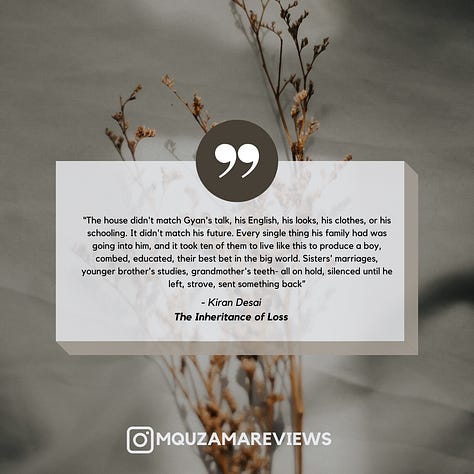
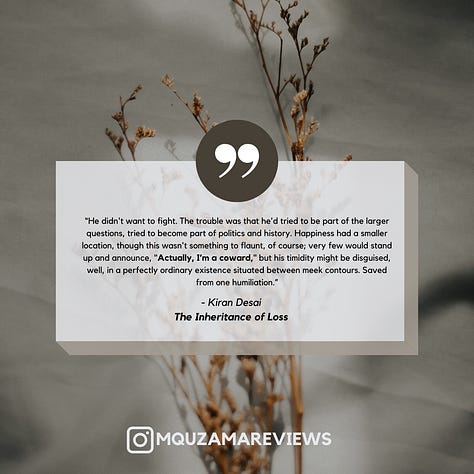
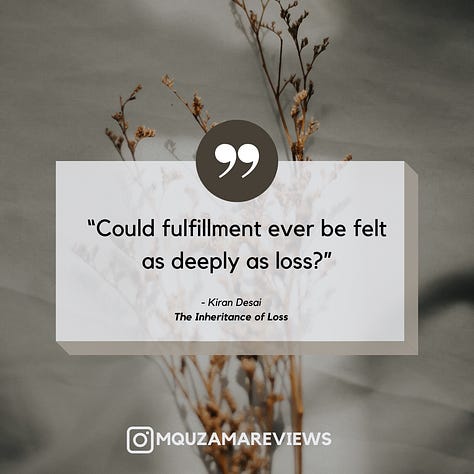
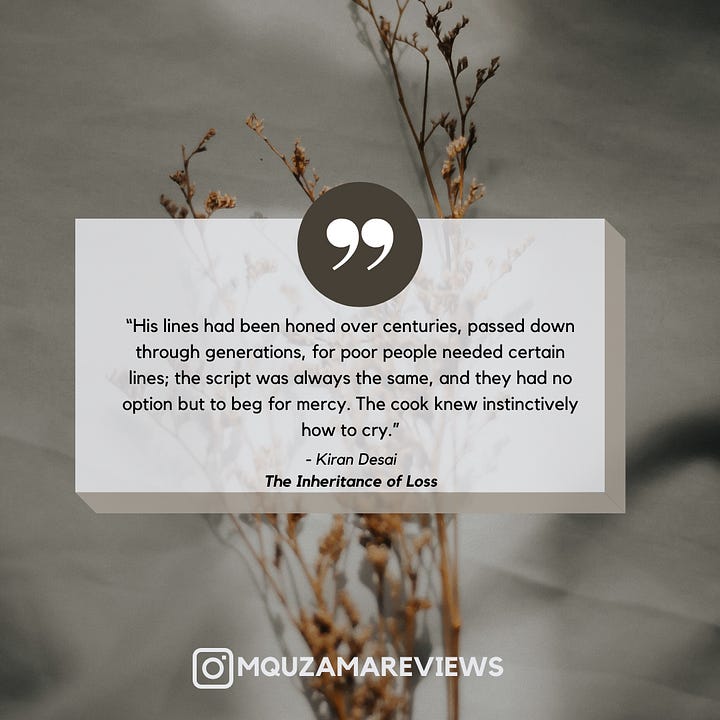
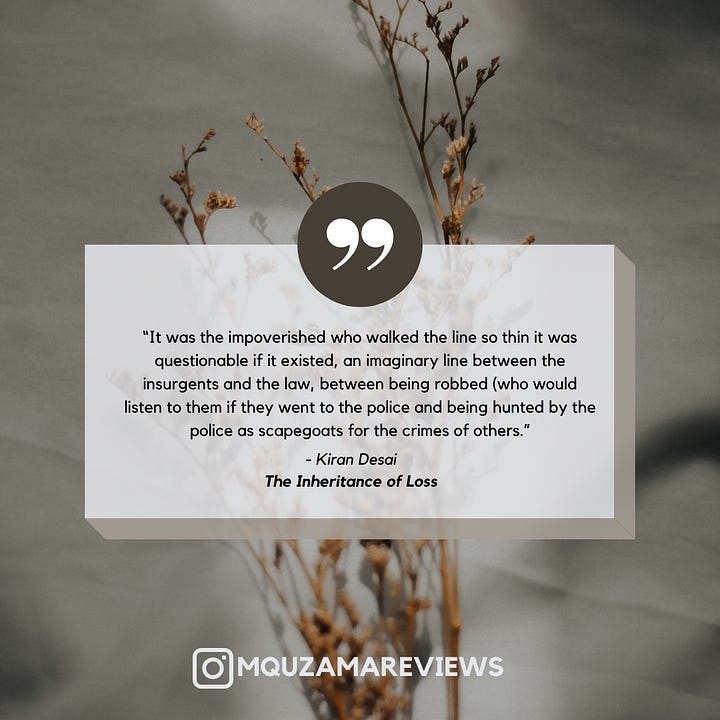


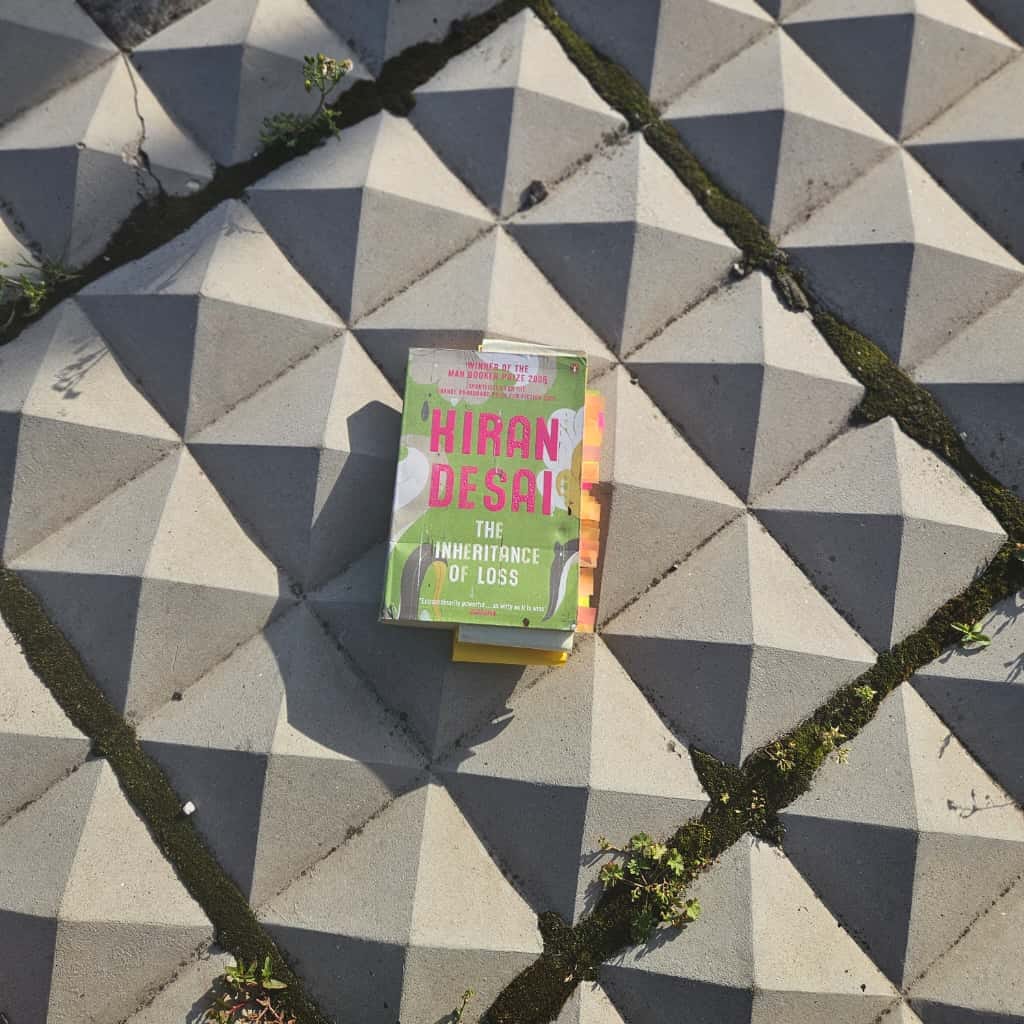
I've enjoyed reading this review. The myriad of characters had me all over the place yet got me excited to actually have a hold of this novel!